Only articles in with the "eParticipation" tag are displayed
To display all articles click
here.
 |
2. September 2012 – 12:34 by gabor
|
 A couple of weeks ago, Anthony Zacharzewski, social activist of The Democratic Society wrote a review on our association’s project that had the working title ‘webvotr’ and has since been named Civilzone.
A couple of weeks ago, Anthony Zacharzewski, social activist of The Democratic Society wrote a review on our association’s project that had the working title ‘webvotr’ and has since been named Civilzone.
We very much appreciate any feedback regarding the site and any comments would be greatly appreciated. Besides highlighting the elements of the initiative that he found most appealing and wishing us success, Anthony also raised a few interesting questions and pointed out some risky areas where we might not reach our original goals.
He suggested three possible problems.
Civilzone openly aims to mobilize society on international, national and at local government levels – Anthony thinks that in small local communities the so-called “Empty Restaurant Syndrome” might occur; due to the lack of users and interaction, the number of people joining smaller governmental units will not be enough to form a community able to make real changes and decisions. As an example, he quoted iCan, BBC’s similar project from ten years ago.
Although his worries are reasonable, I think this does not represent a real danger for us: there are two reasons why.
One of them is that while BBC forcefully tried to organise every single parish’s government from above, our scenario is completely different; we’ll try to begin organising the groups of administrators running the application on national level in as many countries as possible.

The administrators will post the parliamentary initiatives, then first the opponents are expected to demonstrate their dislike, and the ones in favour of the initiative will then show their support in reply to the negative arguments. Subsequently, there will hopefully be individual initiatives and perhaps success stories too, similarly to Hamburg’s Transparency Law.
Smaller communities will only be formed after this, as need for them emerges. As soon as we have at least one or two people willing to organise a community, they will be granted the opportunity from the administrators moderating the particular administrative area. By this time, results achieved on national and EU-levels will be the inspiration for many.
The other reason is that internet today is very different from what it used to be 10 years ago: not only regarding the number of users but also in terms of the transmission speed of information.
BBC’s iCan drew attention to the application but failed to generate activity. Even if a few individuals were determined to convince their friends and acquaintances of joining they could only attempt to do this through email and in person. Today the social network is a very active place where using the network of connections, clearly demonstrating the principle of 6-7 steps, the right information can spread on a global scale in seconds. Every comment left and every vote cast on civilzone will appear on the user’s Facebook wall, visible to all his friends, allowing societal participation to go viral.
I find the second query to be the most interesting: Anthony says that online experience so far has shown that only people from “the same side” can effectively cooperate on political matters. Besides many great examples, I can also point out current Hungarian ones: on Facebook, pages having around a hundred thousand likes, like One Million Strong for the Freedom of Press in Hungary or Viktor Orbán’s, it is clear that only people belonging to the same side can get along well. If every once in a while someone from “the other side” comes over, they either only want to disrupt the community, or if they’re actually trying to reason together or make a consensus, some keen users from the original community will make it clear with their atrocious comments that there’s no room for them here.
The difference for us lies in the fact that on civilzone we’ll have specific issues and initiatives that affect the lives of the people who live in the civil parishes rather than pages of organisations, parties and movements. So I hope that instead of supporting parties and taking sides, the discussion will focus on how much passing or rejecting a particular initiative can serve the interest of the community.
In order to promote this, we incorporated two features into the application: firstly, displaying the most popular pro and con arguments; secondly, the possibility of sending in articles or blog posts.
The third argument to be considered is the following: “How can it represent those offline, and how can it avoid just giving a stronger voice to those who (through education, wealth or position) already have a strong voice?”
Perhaps this is the area where we have the biggest cultural difference: in Hungary, besides online newspapers and weekly prints, there is only one radio station and one television channel that clearly voice the left wing’s standpoint – in opposition since 2010 – but even these are experiencing various difficulties. The internet on the other hand is widely known as a source of objective information and a means of taking a clear look at both sides of the coin. With regard to the above, the application would actually amplify the voice of those who are now in minority besides the crowds who voted the present government into constitutional supermajority.
Freedom of press is of course a separate issue; the parallelism here is not entirely correct.
I think that Anthony’s following query is the most relevant: it is true that those without internet access will not have a chance to effectively represent their interest through the application. Even though the growth is unstoppable and 92.9% of Sweden’s, 84.1% of the UK’s and 82.7% of Germany’s population are already able to access the World Wide Web, the figures quoted still do not make up 100%.
One possible solution is to use the application to demonstrate even more clearly that in an information society, internet access should be a universal human right – numerous countries (Estonia, Finland, France, Spain and Greece) have succeeded in implementing this. Civilzone could provide a way to start a petition in the European Union and it could be a useful, influential tool in shaping politics and the public opinion even for those wanting to help people living on the edge of the society.
In my personal opinion, the most challenging part of the project is building an international network. Even though I don’t have years of experience in this field I can see that in the case of e-participation or at least in organising activism through the internet, civilians – especially the younger members of the Y and the almost grown-up members of the Z-generation – are more successful than civil activists and also that thinking and keeping in touch on European or global level is quite rare.
It is very fortunate that organizations like PEP-NET and Participedia exist and improve the situation greatly, allowing us to write to you here, but I think more activity, discussions, statements, petitions and demonstrations, all in all, more participation is required to achieve our common goals.
Because of this, I’d like to ask everyone to write if they feel like they have something to comment about the present or the previous article; let’s ease the burden on John Heaven’s shoulders a little!
If you prefer paying attention from the background, I’d like to recommend Anthony’s organization and also our organization.
Let’s do some networking.
Posted in members, Projects | No Comments »
 |
22. May 2012 – 10:09 by Asociacion Ciudades Kyosei / Pedro Prieto-Martin
|
 This week Avaaz, the “campaigning community bringing people-powered politics to decision-makers worldwide’, started the beta-testing of its community petitions platform, which allows anybody to launch a petition in a question of minutes. This new systems empowers anybody to make use of the streamlined processes and tools that have allowed Avaaz to grow its user base to more than 14.400.000.
This week Avaaz, the “campaigning community bringing people-powered politics to decision-makers worldwide’, started the beta-testing of its community petitions platform, which allows anybody to launch a petition in a question of minutes. This new systems empowers anybody to make use of the streamlined processes and tools that have allowed Avaaz to grow its user base to more than 14.400.000.
 Avaaz thus follows the recente move from change.org, the “social action platform that empowers anyone”, which just two weeks ago ‘absorved’ the Spanish platform “Actuable” and is now planning to translate its ‘petition making system’ to many other languages to really extend its reach worldwide.
Avaaz thus follows the recente move from change.org, the “social action platform that empowers anyone”, which just two weeks ago ‘absorved’ the Spanish platform “Actuable” and is now planning to translate its ‘petition making system’ to many other languages to really extend its reach worldwide.

Each of these platforms claims to have promoted petitions that forced very important political ‘actors’ to react: from Hillary Clinton to Presidente Morales, from Bank of America and Apple to Hilton Hotels.
 This is an interesting ‘tectonic’ move in the realm of (e)Participation, which we should follow closely. It is, additionally, much related to the discussion about “Sticks and Carrots” we hold in Pep-Net’s blog a year ago.
This is an interesting ‘tectonic’ move in the realm of (e)Participation, which we should follow closely. It is, additionally, much related to the discussion about “Sticks and Carrots” we hold in Pep-Net’s blog a year ago.
We were then reflecting about questions like: is it better to praise “good deeds” of Corporation and Politicians, or is it better to warn and punish them when they “misbehave”? Why not both things at the same time?
Anita Roddick, the founder of the Body Shop, reported that once an executive of Shell told her: “We don’t fear regulation, we only fear consumer revolt”
Well: it is clear now that consumer and citizens are getting better at revolting and exerting pressure. Change is happening out of anybody’s reach, and (e)Participation is slowly “getting teeth”, which soon will be able to hurt enough as to influence behaviour: if you do not want your brand reputation to get ruined… you better behave!!! And this applies to corporation as much as political actors.
The promise of a ‘Future Goverment’ that becomes FAST (flatter, agile, streamlined and tech-enabled) -which was delivered in the last World Economic Forum- starts to be truth. But, for sure, it is not government who is promoting it. It is NGOs and CSOs. It is citizens.
It is important to note that the technology behind these petition plattforms is very, very simple. The concepts and processes of use are also not sci-fiction. But for sure, this kind of powerful, sustainable and social minded (e)Participation was rarely promoted by our Governments’ Innovation Support Actions. Instead of an impact oriented eParticipation research, put at the service of Civil Society, a Government- and Academia-centred approach was preferred. And thus eParticipation has just advance by little steps.
It is a pitty, because these platforms are now out there, growing. They were created with less (or ‘no’) involvement of eParticipation researchers. And that means that we do not have easy access to the very valuable information about eParticipation that these systems are generating (about pattern and reasons of use, users’ demographics, typologies of action, success rates, etc).
We should reflect about this. We have not so many more opportunities to miss. The field is developing faster and faster. Do we want to be part of it?
Posted in good practice, ICT, inclusion, Tools, Trends, Visions | No Comments »
 |
21. March 2012 – 12:46 by cynthiawagner
|
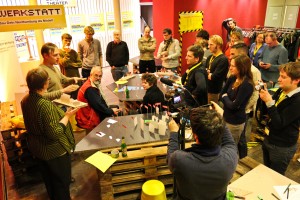 The growth of movements like the Right to the City Movement and protests like Stuttgart21, Gängeviertel, or NO BNQ show the continuously increasing demand for more public participation in urban development. The pilot project Nexthamburg experiments with new ways of public participation in the urban development of Hamburg. The concept of the open and independent crowd-sourcing project will be presented at the PEP-NET Summit on 14th May.
The growth of movements like the Right to the City Movement and protests like Stuttgart21, Gängeviertel, or NO BNQ show the continuously increasing demand for more public participation in urban development. The pilot project Nexthamburg experiments with new ways of public participation in the urban development of Hamburg. The concept of the open and independent crowd-sourcing project will be presented at the PEP-NET Summit on 14th May.
Nexthamburg gathers solutions and challenges for the city of Hamburg in crowd-
sourcing processes. Citizens can post their own solutions for the big challenges on the webpage or other Nexthamburg social media channels, discuss, comment or follow others, create their own vision for Hamburg. They can also participate in one of the Nexthamburg events, for example Nexthamburg Sessions, Salon, Zukunftscafés, or the Zukunftscamp.
The long-term goal of the project is to organize a crowd-funding channel for promising ideas for Hamburg’s urban development to finance feasibility studies and realization efforts.
Nexthamburg is active since April 2009 and has been promoted as a pilot project of national politics of urban development by the federal ministry for traffic, building, and urban development until 2011. It is supposed to become a non-profit association in 2012.
Nexthamburg on nexthamburg.de, facebook, twitter, google, flickr, youtube, issuu
Posted in Events, News, Projects, Visions | No Comments »
 |
12. October 2011 – 17:16 by Centre for E-Government
|
In modern democracies, people are to be empowered by means of information and communication technologies. Transparency and access to data, new ways of interacting with government and democratic institutions cause profound changes in society. Social media and the new forms of societal behaviour, including content generation, collaboration and sharing as well as network organisation change our understanding of politics and business. Governmental and private internet services have increased the citizens’ independence and flexibility. However, enthusiastic ideas and projects often failed to produce the expected results as technology is only the basis for new forms of organisation and interaction. CeDEM12 seeks to critically analyse present and future developments in e-democracy and open government. >> https://www.donau-uni.ac.at/cedem
CeDEM12 presents the following tracks:
- E-Participation
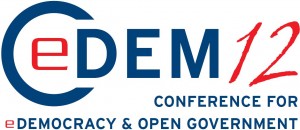
- Government 2.0
- Social/Web Media and Public Administration
- E-Politics and E-Campaigning
- European Citizen Initiative
- Participatory Budgeting
- Bottom-Up Movements
- Open Data and Open Access
Submission Deadline: 12/12/2011
.
We would like to invite individuals from academic and applied backgrounds as well as business, public authorities, NGO, NPOs and education institutions to submit their papers, reflections as well as workshop proposals. We welcome interdisciplinary approaches to the emerging conference topics. This year we want to encourage practitioners to submit papers as we provide a specific section for non-academics. Conference language is English.
.
Publications:
The conference proceedings will be published with the Edition Danube University; additionally, the complete proceedings will be made accessible online. A selection of best research papers and case studies of CeDEM12 will be published with the Open Access eJournal of eDemocracy and Open Government. (www.jedem.org)
- Research papers shall be 12 pages maximum and will be double-blind peer-reviewed.
- Case studies/project papers shall be 12 pages maximum and will be double-blind peer-reviewed.
- Reflections shall be 4 pages maximum and will be selected by the chairs.
You can download last year’s conference proceedings at the conference website!
Important Dates:
- Deadline for the submission of papers and workshop proposals: 12 December 2011
- Conference: 3-4 May 2012
Further Information
.
Posted in calls & tender, Events | No Comments »
 |
28. July 2011 – 16:49 by Asociacion Ciudades Kyosei / Pedro Prieto-Martin
|
“The e-(R)evolution will not be funded. An interdisciplinary and critical analysis of the developments and troubles of EU-funded eParticipation” is the title of a paper that our association recently wrote as part of our research and knowledge dissemination efforts. The article is meant to be properly published soon, but some bureaucratic issues have delayed its release more than we can wait.
Because this paper needs to be read and, more important, discussed while its analyses are still current.
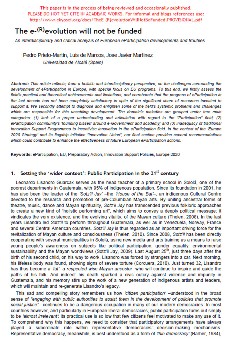 Thus, we have decided to make it provisionally available through PeP-NET. To start such a conversation, what better place than PeP-NET, the Pan European eParticipation network?
Thus, we have decided to make it provisionally available through PeP-NET. To start such a conversation, what better place than PeP-NET, the Pan European eParticipation network? 
We have spent many hundreds of hours researching and writing the paper, as we struggled to make sense of the developments and “under-developments” of eParticipation in the last ten years.
Our appraisal is based on an extensive and interdisciplinary analysis of distinct relevant sources, which included the most recent reports, articles and literature reviews dealing with eParticipation research, practice and theory, as well as projects’ deliverables and evaluations, related databases, and our direct examination of eParticipation systems.
We had to resort to a very varied bunch of disciplines (from history and medicine to Mayan performing arts; seriously!!  ) to be able to achieve a comprehensive understanding of the field’s challenges… and to make a compelling exposition of them.
) to be able to achieve a comprehensive understanding of the field’s challenges… and to make a compelling exposition of them.
The paper ended up being “quite controversial”, as our assessment of eParticipation came to suggest that some of the problems that have hampered its progress have a systemic, overarching character: that kind of ‘elephant in the living room’-issues whose very existence tends to be denied because of their complexity or the embarrassment they cause and, as a result, cannot normally be acknowledged or discussed, let alone get properly sorted out.
Examples of the “embarrassing questions” the paper poses are:
- How can it be that after 10 years… all relevant ‘agendas’ of eParticipation research are still reported as underdeveloped?
- And how can it be that even the most basic questions –for example: the relation of Participation and eParticipation, or the understanding of the dual nature of eParticipaton as something that can be driven by authorities or by citizens themselves– remain unsolved?
- More than 187 millions of Euros were invested in the last ten years to promote experimentation in the field, so… where are the results? Where are the breakthroughs and the research milestones? Can we feel satisfied with just some “vague confirmations” of ideas that 10 years ago could already have been easily guessed?
Through the paper, we have done our best to constructively diagnose eParticipation and to propose some treatments for the field’s maladies. But our perspective and understanding are necessarily limited: the real “treatment” for those problems would require a reflection process that involves the whole eParticipation community.
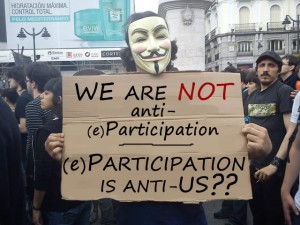 We see this paper as an urgent “call for self-reflection” and consider it a “MUST READ” for anyone involved in European eParticipation: from the officials working at EC’s Directorate for Information society and Media, to the researchers, practitioners, NGOs, public workers, citizen associations… and even any interested European citizen.
We see this paper as an urgent “call for self-reflection” and consider it a “MUST READ” for anyone involved in European eParticipation: from the officials working at EC’s Directorate for Information society and Media, to the researchers, practitioners, NGOs, public workers, citizen associations… and even any interested European citizen.
Therefore, we would like to encourage all our PeP-NET friends and in general all people with interest in eParticipation… to have a look at the paper during this nice summer weekend. 
Anyone who feels “touched” by any of the paper’s claims and argumentations… should speak up and comment to this post. It doesn’t matter if it is to support, extend or complement our asseverations, or to oppose, challenge or further qualify them… please, share your views.
PeP-NET was meant to be a HUB for the conversations around eParticipation. So… let’s discuss. It is important that the issues we showed –be them real or imagined– are talked about, and possibly acted upon.
The environment where we operate is moving. Moving faster and faster. And in the context of the ‘Europe 2020 Strategy’ and its flagship initiative “Innovation Union”, which aims to renew EU’s “Research and Innovation Funding Programmes”, the most important question we need to answer is: “What do we do now??”
For sure, we could keep pretending that there is NO elephant in the living room. Stay in our “academic” Ivory Tower, and just continue doing as we did so far… while we wait for the “barbarians of eParticipation” to arrive, change the democratic landscape by really integrating ICT in governance… and make fools of all us. PeP-NET subscribers included. 
But in our association we want to believe that we, the European eParticipation Community, could do much better than that.
So… no more to say!! Thank you very much for your attention. We hope some of you enjoy reading of our paper and some exchange of ideas can happen afterwards.
—– ADDITION: A CONCEPTUAL MAP SUMMARISING PAPER’S KEY FINDINGS —–
Several people asked for a “summary” version of the paper. Here you have a JPG image (2,5 Mbytes) displaying a Conceptual Map that summarises the paper’s key findings.
I recommend you to save the file first, and then open it with an image editor (like Office Picture Manager) to watch it. It’ll be more easy for you to zoom in and out in the different parts of the image.
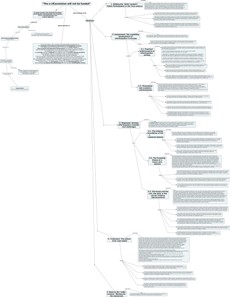
Posted in ICT, Projects, Tools, Trends, Visions | 24 Comments »
 |
21. July 2011 – 17:45 by John Heaven (TuTech Innovation GmbH)
|
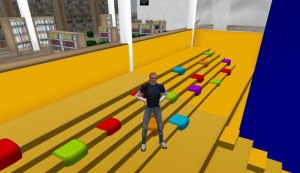
Me, posing in Second Life
This morning I went for a walk in a place on the other side of the channel which doesn’t exist yet. All without leaving my desk. Thanks to Birmingham’s Second Life model of the Library of Birmingham, the real life version of which is due to be opened in 2013, I was able to have a look at what they’re planning.
A couple of months back I blogged about Birmingham’s virtual model of the Library of Birmingham, then in the later stages of development. Earlier this month the Virtual Library went live, meaning that people from Birmingham (and beyond) can see a virtual model of the library that is scheduled to open in 2013 and let the developers know what they think.
As a Brummie, I recognised Centenary Square, and it was clear where the new library will be located and easy enough to get in (although Second Life can take a bit of getting used to before you start walking like you’re sober). Almost all areas of the library are accessible, and you can even choose whether to take the escalators or teleport to the different floors. It gives a good feel of how the library will eventually look and I noticed that some people had already commented on the building: one visitor was “concerned about the floor — it might do your head in!” and someone advised “Make sure the tables are able to be used by disabled people and children.”
As I mentioned in my previous article, the Virtual Library launch is being accompanied by a range of activities to ensure that it doesn’t go unnoticed in Second Life. Regular workshops are being held at the current library for the public, who are then able to use the computers at the library to access Second Life or go home and try it themselves. Those who don’t fancy signing up for Second Life can either view fly-through videos of the library or submit their comments using questionnaires.
For more information about the launch of the Virtual Library, you see the press releases from Birmingham City Council and from Daden, the company that created the model. I’m going to get an update from library staff after their current phase of outreach work, so watch this space!
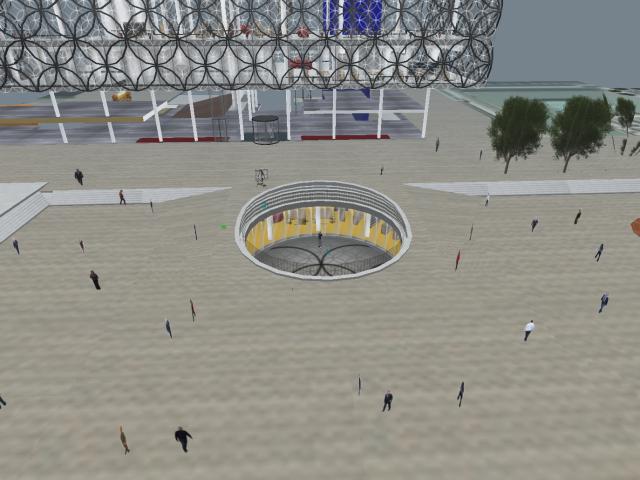
Can you spot me?
Posted in good practice, News, Projects, Trends | 2 Comments »
 |
9. June 2011 – 12:11 by Asociacion Ciudades Kyosei / Pedro Prieto-Martin
|
News from the Asociación and our main project (english version at the bottom  ).
).
—
Como resultado del nuevo escenario creado en España por movimiento cívico “15M”, que ha inundado las plazas de las principales ciudades españolas (y algunas del extranjero) con sus demandas de una “Democracia Real YA”, en la Asociación Ciudades Kyosei hemos decidido “ponernos las pilas”, para producir cuanto antes una versión alpha del sistema “Kyopol” (aka. “Ciudad Simbiótica”), que podamos poner al servicio de todos los procesos de activación cívica y movilización social que deberían ahora darse, barrio a barrio, en todas las ciudades de España.
Ello nos ha demandado un un cambio de actitud: se hace necesario establecer un equipo más amplio, repartir responsabilidades… y así crear algo útil cuanto antes.
Pues bien, tras un par de reuniones muy productivas ayer martes y el pasado domingo… ¡¡el proceso de creación del Sistema Kyopol se considera “oficialmente iniciado”!!
El Sistema Kyopol (aka. “Ciudad Simbiótica”) fomentará la Implicación Cívica y la “Activación Ciudadana” en los ámbitos municipal y regional. Permitirá a los ciudadanos informarse, formarse y colaborar unos con otros en la mejora de su entorno vital, trabajando en aquellas temáticas que cada uno considere importantes.
No sólo eso: buscaremos que usando el Sistema Kyopol… ¡¡podamos pasarlo “de miedo”!! Que sea una experiencia tremendamente placentera, incluso divertida, eso de unirte a otras personas para implicarte en el “cuidado de lo publico”.
Para la Asociación Ciudades Kyosei… ¡¡haber logrado alcanzar este hito es algo sensacional!! Queremos agradeceros a todos los simpatizantes de la asociación el apoyo que nos habéis brindado hasta ahora y advertiros… ¡¡que ahora es cuando empieza el trabajo de verdad!!
Nuestro trabajo se desarrollará a partir de ahora mediante la estrecha colaboración de dos equipos:
- Primeramente, el “Grupo impulsor” -compuesto por informáticos, investigadores y personas vinculadas con la participación- construirá prototipos del sistema y establecerá las metodologías, los recursos participativos y los arreglos institucionales que formarán parte del sistema.
- En segundo lugar, el “Colectivo de pioneros”, integrado por representantes de todos los colectivos que usarán el sistema (desde ciudadanos y asociaciones de vecinos a políticos y técnicos municipales, pasando por medios de comunicación, ONGs, sindicatos y partidos políticos y, por supuesto, ahora también movimientos sociales del estilo 15M, DRY y demás bichos que éstos engendrarán en los próximos meses), que nos ayudarán probando los sucesivos prototipos del sistema, y proporcionandonos feedback en relación a las funcionalidades y procedimientos que propongamos.

En base a ello, podremos disponer de una versión Beta del sistema, lo suficientemente madura para iniciar proyectos piloto. Primeramente en el entorno de Madrid -que es de donde provienen la mayoría de nuestros Pioneros”-, y posteriormente en todas las regiones de España, y finalmente en el ámbito Latino-Americano y Europeo.
Si tenéis interés en formar parte del “Colectivo de Pioneros”, por favor contáctanos cuanto antes.
Planeamos realizar un acto de presentación del proyecto a todos sus potenciales interesados, en las instalaciones de la Universidad de Alcalá. ¡¡Os invitamos a tod@s a que nos acompañéis en el evento!!
Os mantendremos informados (podéis seguirnos en la web de la asociación, facebook o twitter).
—–
Urged, and inspired, by the emergence of the #SpanishRevolution, which has crowded the main squares of many spanish cities (and several foreign ones too!) to demand a “Real Democracy NOW!”… we have tried to accelerate our association’s projects.
And… after a couple of very productive meetings on Tuesday and on last Sunday … the construction of the “Kyopol System” has been “officially started”!
Kyopol (aka. “Symbiotic City”) will promote “citizen activation” and civic involvement in the municipal and regional levels. It will allow citizens to inform themselves about civic issues, “educate” themselves on how to “participate”, and collaborate with each other to improve their shared living environment, by collaboratively working on those issues that each one considers important.
Actually, our aim is that by using Kyopol we citizens will be able to experience a great deal of fun (and proudness!). Isn’t that the way that “meeting fellow citizens to jointly care and work for the common good” should taste?!
For the Asociación Ciudades Kyosei… having reached this milestone is something sensational! We want to thank all supporters of the association for the help we have received so far, but also warn them… that the real work is about to start!!
Our work will be developed through the collaboration of two teams:
- First, the “Core Team”, which is mainly composed of developers and citizen participation’s researchers, practitioners and stake-holders, who will work together to construct prototypes and establish the participatory methodologie,s the formative resources and the institutional arrangements that will surround Kyopol.
- Second, a “Pioneers Team”, that integrates representatives of all groups that will use the system (citizens, neighbourhood associations, governments oficials, politicians, NGOs, media, social movements, etc…). They will act as “Alpha testers”, and will help us testing our prototypes and providing feedback in relation to the functionalities and the participatory methodologies and resources we propose.

Based on this work, we will construct a Beta version of the system, mature enough to initiate pilot projects. These will first first in the surroundings of Madrid, where most of our Pioneers are located, and will afterwards get extended to several regions in Spain, and finally to the wide Latin American (and European) environments.
The next milestone we are planning is a meeting at the University of Alcalá, where the project will be presented to all potential stakeholders. Collaborative work will start immediately afterwards.
We’ll keep you informed (and you can follow us on our website, facebook or twitter).
Posted in ICT, members, Projects, Tools, Visions | No Comments »
 |
17. December 2010 – 17:25 by John Heaven (TuTech Innovation GmbH)
|
You’ve joined us for live chats on the blog, taken part in our online discourses, chatted to us at conferences, read PEP-NET members’ articles, and downloaded the free PEP-NET Issue of JEDEM. Eighty-six of you even came to Hamburg to join us for the PEP-NET Summit. Before the year is out, we would like to ask you take part in one final activity: our survey “Looking Forward, Looking Back: eParticipation Trends in 2010 and 2011.”
So what were the main trends in 2010? What areas of eParticipation made particular progress, and what events defined the eParticipation calendar? And while you are thinking about trends, what do you think will be up and coming in 2011? Nobody can predict the future, but it will be interesting to find out how 2010 was for friends of PEP-NET, and what they expect in 2011.
When I’m back in the New Year, I’ll put together a summary of results. I think it will make for interesting reading – but only if you take part, that is!
In the meantime, from Edinburgh to Athens, Madrid to Minsk: wherever you are, Merry Christmas and a Happy New Year!
Posted in members, Trends, Visions | No Comments »
 |
8. October 2010 – 10:09 by Bengt Feil (TuTech Innovation GmbH)
|
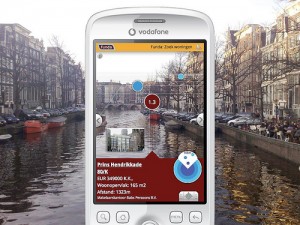 In January of 2010 I wrote an article about the possibilities of augmented reality in eParticipation. Three quarters of the year in augmented reality, as a method of layering information onto the real world, has developed further and looks like it is here to stay and therefore keeps being interesting for eParticipation. It however also is part of a greater challenge the eParticipation community faces.
In January of 2010 I wrote an article about the possibilities of augmented reality in eParticipation. Three quarters of the year in augmented reality, as a method of layering information onto the real world, has developed further and looks like it is here to stay and therefore keeps being interesting for eParticipation. It however also is part of a greater challenge the eParticipation community faces.
Several things hint at the coming of age of augmented reality:
- The platforms being able to use augmented reality apps have gotten more common with iOS and Android hardware having the necessary sensors and cameras and being widely successful in the market place. However with the availability of more devices the differences among them are also getting bigger (for example a gyroscope is only available in the iPhone 4 right now). This video gives a good overview of the available platforms).
- Augmented reality seems to come into the mainstream slowly as the discussion around PlaneFinder shows. This app lets you point your phone at a plane in the sky and get information like position, height and speed, and has been deemed as being possibly dangerous to airplane security. Even though augmented reality is still gimmicky in many cases new uses bubble up every day and the technology might find a strong place in mobile app use over time.
- Another hint of the growing interest in augmented reality is the time spent by developers building the apps. From September 2009 to June 2010 the number of AR apps in the Appstore rose from 83 to 480. This shows that augmented reality is still a niche but on the rise.
So what to make out of the fact that this way of displaying information on mobile devices is here to stay? For eParticipation this challenge has to be seen in the greater context of the transformation from almost all web-usage being in a standard web-browser on a computer to a multi-device (phone, tablet, TV) profile.
The eParticipation user of today might jump for one device and mode of usage (e.g. consuming information to adding content) to the other quickly and modern eParticipation platforms should be able to handle this challenge. From this angle augmented reality is just one more brick in the wall (consisting of many bricks).
I will pick up this topic in another article and try to discuss how the problem of getting eParticipation working in so many different settings could by addressed from a technical and procedural point of view.
Posted in Trends | No Comments »
 |
28. September 2010 – 16:57 by John Heaven (TuTech Innovation GmbH)
|
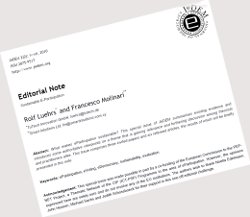
The PEP-NET Special Issue of eJournal of eDemocracy (JeDEM), which Francesco Molinari and Rolf Lührs guest edited, is now available at www.jedem.org. It addresses the topic “sustainable eParticipation”, asking what ‘sustainable’ means in this context and turning to experts in the field for advice on ensuring European eParticipation projects overcome problems with low participation rates and impact.
The Special Issue contains a total of nine papers, three of which are invited papers from prominent eParticipation actors. The remaining six are scientific research papers and case studies.
The authors are successful in shedding new light on eParticipation, with a wealth of hints and tips on how to make eParticipation sustainable. Here is a list of concrete prerequisites for sustainable eParticipation gathered from the various papers as part of the editorial:
– A favourable policy and legislative framework (Chrissafis and Rohen, Hinsberg);
– Official recognition from the public decision-makers (Badouard);
– Efficient (Velikanov) and transparent (Johnston) procedures for the aggregation and visualisation of user preferences;
– Trust building on the whole process (Rodrigues Filho);
– A suitable ICT infrastructure (Hinsberg, Hermida) posing weak constraints on users’ behaviour (Badouard) and making the most out of the inputs (Li);
– A community of active (Hinsberg) and skilled (Maier-Rabler and Huber) citizens;
– A participatory culture among the population (Li, Maier-Rabler and Huber).
Of course it is not possible to distil the whole journal into a single blog post – you will simply have to read the journal to benefit from the wealth of knowledge and experience that it reflects by visting https://www.jedem.org/.
The journal was ready in time for last week’s PEP-NET Summit, at which the issue of sustainability was also raised. Like the Summit, the JeDEM Special Issue benefited from PEP-NET’s unique network of eParticipation actors across Europe and will help to ensure that there is ongoing reflection on how eParticipation can make a positive, long-term contribution to our democratic culture. JeDEM is published twice per year since first being published in 2009. The Centre for E-Government at the Danube University in Krems, Austria, manages the publication process which involves a team of 35 editors.
Posted in Uncategorized | No Comments »
 A couple of weeks ago, Anthony Zacharzewski, social activist of The Democratic Society wrote a review on our association’s project that had the working title ‘webvotr’ and has since been named Civilzone.
A couple of weeks ago, Anthony Zacharzewski, social activist of The Democratic Society wrote a review on our association’s project that had the working title ‘webvotr’ and has since been named Civilzone.





 The growth of movements like the Right to the City Movement and protests like Stuttgart21, Gängeviertel, or NO BNQ show the continuously increasing demand for more public participation in urban development. The pilot project
The growth of movements like the Right to the City Movement and protests like Stuttgart21, Gängeviertel, or NO BNQ show the continuously increasing demand for more public participation in urban development. The pilot project 














